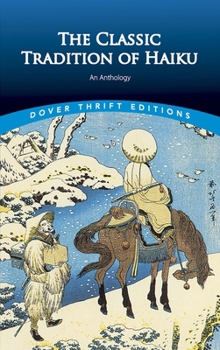The Classic Tradition of Haiku: An Anthology
A highly distilled form of Japanese poetry, haiku consist of 17 syllables, usually divided among three lines. This unique collection spans over 400 years (1488-1902) of haiku history by the greatest... This description may be from another edition of this product.
Format:Paperback
Language:English
ISBN:0486292746
ISBN13:9780486292748
Release Date:September 1996
Publisher:Dover Publications
Length:96 Pages
Weight:0.20 lbs.
Dimensions:0.3" x 5.3" x 8.4"
Age Range:14 years and up
Grade Range:Grade 9 and higher
Customer Reviews
5 ratings
Name Me Something Else A Buck Can Get You That Brings So Much With It
Published by Thriftbooks.com User , 19 years ago
Dover Thrift Editions are a wonderful idea. For between a dollar and two dollars each, someone can own the greatest works of human literature, philosophy, history, and poetry. Spectacular concept! In this volume, five centuries of Japanese haiku as composed by some of the genre's greatest masters is translated and compiled. This works as either an introduction to these "written snapshots" or makes a nice addtion to the library of a haiku fan.
An Excellent and Quaint Little Book of Haiku at its Best
Published by Thriftbooks.com User , 23 years ago
I really enjoyed reading this book because I love the beauty and simplicity of haiku poetry. Although this is a relatively thin book, it contains very resourceful and detailed information about the haiku poets and thier inspirations. I really appreciate the author's acknowlegement of the female haiku poets, in which most became buddist nuns, proving that women were just as an important part of the haiku scene as the men. In conclusion, this book is a pleasure for the senses and a must for anyone's library.
This would be wonderful, even if it cost more.
Published by Thriftbooks.com User , 25 years ago
You're unlikely to find a better bargain this year on a book. My favorite thing about this book is that the editor often presents multiple English translations of single poems. This illustrates as dramatically as I can imagine how complex the problem of translation is. The format is a bit awkward and the paper isn't of the best quality, but I'm glad to have added this to my collection.
A great overview of literary trial by translation.
Published by Thriftbooks.com User , 26 years ago
This book is not only the best haiku bargain for the buck, but a valuable snapshot of the trials and tribulations any literature is likely to go through in the translation process. Bowers has given the reader a semester's worth of translation styles and problems to consider. Anyone interested in the problems of translation, or in taking on the translation of haiku, can learn from this book. Also, anyone attempting to review the literature on haiku in English should probably start here, for it gives sample translation from virtually every serious book on the subject in or out of print at the time of compilation (1996). Bowers knows his stuff, and his Japanese, and contributes some very fine translations occasionally himself.You couldn't go wrong on this for a first book of haiku!
A Delightful Bargain
Published by Thriftbooks.com User , 27 years ago
Most of us will remember reading a few selected haiku poems in grade school, but this anthology offers over 200 poems from a 400-year period. Faubion Bowers did a superb job of introducing, selecting, and annotating the poems, and the translations are accompanied by their transliterated Japanese originals, a feature that helps English readers to see the economy of haiku, as well as the alliteration often lost in translation. Works of this caliber seldom cost so little. Haiku (roughly translated as "unusual verse") is a highly compact form of Japanese poetry. Its origins are in popular literature, and it was somewhat of a superficial fad until Basho and other writers raised it to an art form. One of the key characteristics of haiku is its evocative, reflective nature--it can offer complex ideas in a distilled form. To take one example, from an anonymous writer: I regret picking and not picking violets At first glance, this seems to be a contradictory and perhaps pointless statement. Why would one regret and not regret picking violets at the same time? On further reflection, however, the answer emerges: picking violets is a pleasurable activity but it kills the violet. Hence, one can both regret picking violets (i.e. killing a thing of beauty) and not picking violets (i.e. missing a pleasant pastime). An interesting parallel would be the opening line of Dickens' *A Tale of Two Cities*: "It was the best of times; it was the worst of times." Haiku revels in this kind of elliptical thinking, challenging its readers to reflect beyond the literal meaning of a statement. Even for non-poetry readers, this volume is a delightful bargain. So make some green tea, sit in a quiet garden, and enjoy this book. Bill Ramey





